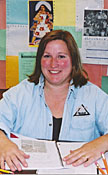







|
|
Students Follow Six-step Program to
Explore Potential Careers
Introduction
/ How Career Exploring Works /
Two Students' Stories / Resources
How program works
For school students career
planning can start as early as the 6th grade. Since Julie Bú works with
Upward Bound students in grades 10 through 12 at Caldwell High School, she
offers career help every other year.
Her process follows six steps:
(Also: Grading /
Lessons Learned)
-
Take a Test:
Students take the Harrington-O'Shea Career Decision Making
Questionnaire, from American Guidance System, a paper and pencil test that clusters a student's
interests, values and abilities into key career areas. She uses Level
2 for her high-schoolers, but recommends Level 1 for younger students.
The 12-page Level 2 booklet test takes about one hour to 90
minutes to complete and can be administered individually or in a
group.
-
Do You Agree? The
first question is: "Do you agree with the results? If
students feel there is a disconnect between their interests and what
shows up on the tests, the student takes the test again.
-
Research:
Once students get test answers that resonate with them, they must
explore in the library and via the internet at least three career
options, locating salary information, a sense of how available jobs in
this field are, and, finally, what colleges might be especially good
for such a career. Sources include the U.S.
Department of Labor
-
Interview
Planned:
From the three careers, students pick their favorite, and must find a
person in that career to either interview, or, even better, spend a
day job shadowing. They can ask family, friends and teachers, or they
can make cold calls to a company with employees in their job field. Students compose a list of questions to ask the
person. The class brainstormed this part of the project
together. Their list includes the following questions:
-
Do you like your job?
-
How many hours a week do you work?
-
What college did you go
to?
-
Was it a good college for this
profession? Why or why not?
-
Does your job allow you to balance
work and family life?
-
Tell me something you don't like
about your job.
-
What advice would you give to a young
person considering entering this job?
-
Interview Conducted:
A few Caldwell High students conducted live
interviews. None of them were able to find someone to job shadow. Most
of them conducted their interviews via email or telephone
conversations.
Students shared what they learned. One, interested in culinary arts,
interviewed eight chefs, each with a different history of preparation.
Another, interested in Marine Biology, an unlikely career for Idaho,
interviewed a Biology teacher, a related field. See other student
stories.
-
Write a
report: Final step is to write a three page report (double
spaced, 12 point) about the entire process, focusing on what they
learned. Find instructions for the writing project on the Resources
page.
Grading:
Students received 200 points towards their
Upward Bound grade for this project including the following:
-
Career Survey - 50 points
-
Interview Questions - 50 points
-
First Draft by due date - 40 points
-
Final Draft - 60 points.
Instructor Julie Bú kept each student's
questionnaire and paper in folders, as a reference in the year
ahead. Up
Lessons
Learned: Bú makes the following observations:
-
Of 34 students, she figures a third of
them "really got a lot out of it."
-
Her first go at this program was in the
Fall of 2001, a "bad time, because people get so busy during the
holiday season." She believes a better time will be
February or later in the spring. Up
Previous
/ Next: Two
Students' Stories
|
 |

Julie Bú finds career program helps "jump
start" students' planning. Resources.
"From three careers, students pick their favorite, and must find a
person in that career to either interview,
or, even better, spend a
day job shadowing."
|
